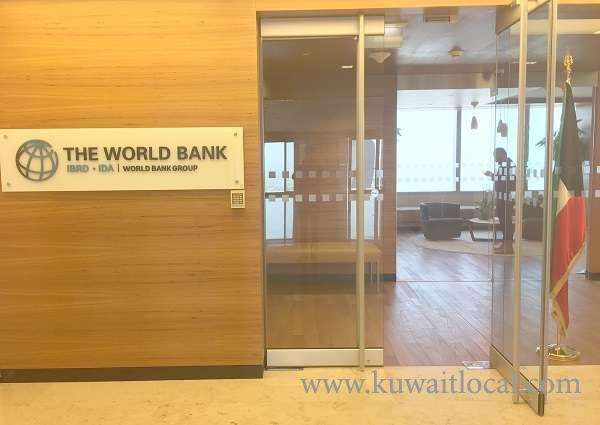Latest News
- Court Sentences Bank Employee To 5 Years For Embezzling 100,000...
- Fake ‘Sheikh’ Sentenced To 2-yr As Court Overturns Verdict
- Justice Ministry New Service On The Sahel App
- Ministry Probes 68 Cases Of Illegal Charity, Funds Collection
- Globally, Kuwait Is Among The Top Consumers Of Incense And Oud O...
- Decrease Seen In Foreign Investment
- Kuwait Customs Seized 2 Containers Laden With Tobacco At Shuwaik...
- Unpaid Salaries, Accountant Beaten Up By Workers
- The Sahel App Was Not Hacked, A Spokesman Claims
- Four Expats Arrested For Stealing Copper Cables Worth 60,000 Din...
- Indian National Died In Abdalli Car Accident
- Work Permits And Foreign Worker Transfers Are Amended By PAM
Kuwaiti Economy Rises To 3 Percent In 2016 - World Bank

The World Bank said on Thursday that 2016 economic growth in Kuwait climbed at a "modest" pace to three percent due to higher oil production and the implementation of major infrastructure projects.
Speaking at its main office in Kuwait in a joint televised press conference from Washington and Riyadh, the bank's Chief GCC Economist Tehmina Khan said that non oil estimates for Kuwait remain "strong." Kuwait's economic outlook remains "relatively resilient" due to substantial oil buffers and government reform plans, she added, commenting on a new World Bank report which also projects "modest" growth in the six GCC states over the next six months.
Sustaining this would depend on the Kuwaiti government's ability to implement its six-point reform plan, she said. The expert also hailed the government's awareness on increasing the private sector's role, which she said would be key in sustaining these reforms.
For his part, Country Director for the GCC Countries Nadir Mohammed said that Kuwait is one of the lowest countries in the region in regards to public debt and would be one of the quickest to return to surpluses.
In its report, the World Bank's outlook until December showed Kuwait as the third least country with general government gross debt (just under 20 percent of GDP) behind the UAE and Saudi Arabia.
The report also projected that growth in GCC states, as a whole, would "gradually recover" from 1.3 percent in 2017 to 2.6 percent in 2019. Regarding the non oil sector, the report expected a gradual recovery due to the slowing pace of fiscal austerity and major reform plans. "The green shoots of recovery are cropping up, helped by the recovery in global energy prices over the past year," said Mohammed.
"That's good for public finances across the region," he said, adding this provides space for governments to focus on long term challenges. Hailing reform plans currently being assumed by the six countries, he added that GCC states should alter their focus on short term spending cuts towards "deeper, multi-dimensional fiscal policy and institutional reforms," such as value-added tax.
However, he noted to several risks, namely regional geopolitical developments, turbulence in global markets and the production of shale oil in North America.
Trending News
-
 Eid Al Fitr 2024: Crescent Moon Not Sighted In Sau...
08 April 2024
Eid Al Fitr 2024: Crescent Moon Not Sighted In Sau...
08 April 2024 -
 Kuwait Implements Home Biometrics Services Ahead O...
14 April 2024
Kuwait Implements Home Biometrics Services Ahead O...
14 April 2024 -
 When Will Eid Al Fitr 2024 Take Place In Qatar, Ba...
08 April 2024
When Will Eid Al Fitr 2024 Take Place In Qatar, Ba...
08 April 2024 -
 On Sunday, The Meteorological Department Warns Of...
07 April 2024
On Sunday, The Meteorological Department Warns Of...
07 April 2024 -
 Kuwait Airways Provides Update On Flight Schedule...
14 April 2024
Kuwait Airways Provides Update On Flight Schedule...
14 April 2024 -
 Kuwait Airways Introduces Convenient Home Luggage...
15 April 2024
Kuwait Airways Introduces Convenient Home Luggage...
15 April 2024 -
 Gathering For Eid Al-Fitr Prayers: Kuwaiti Citizen...
10 April 2024
Gathering For Eid Al-Fitr Prayers: Kuwaiti Citizen...
10 April 2024 -
 Winners Of Kuwait National Assembly 2024 Elections
06 April 2024
Winners Of Kuwait National Assembly 2024 Elections
06 April 2024 -
 An Egyptian Expat Dies At Kuwait's Airport
11 April 2024
An Egyptian Expat Dies At Kuwait's Airport
11 April 2024 -
 Bay Zero Water Park Kuwait: Summer Season Opens Ei...
11 April 2024
Bay Zero Water Park Kuwait: Summer Season Opens Ei...
11 April 2024












Comments Post Comment